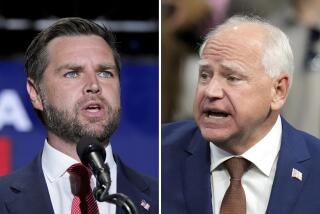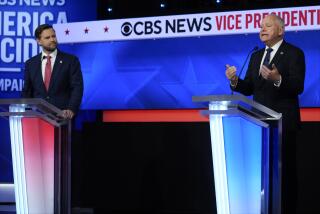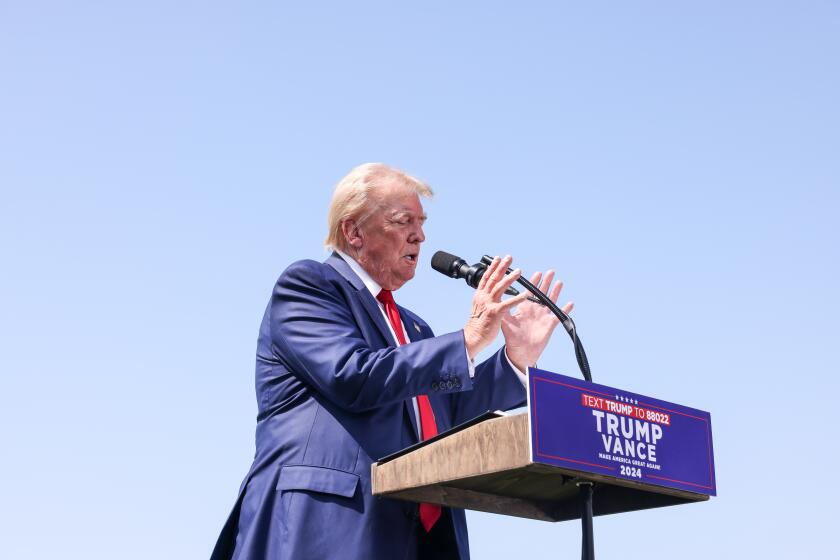Albright in Gulf to Rally Support Against Iraq
Secretary of State Madeleine Albright crisscrossed the blue-green waters and blanched sands of the Persian Gulf region Sunday in a scramble to rally support for the U.S. campaign against Iraq.
For substance, she consulted the sheiks of the Arabian Peninsula’s oil-rich emirates, jetting from Europe to Qatar, then Bahrain, Kuwait and Saudi Arabia to regroup core members of the fragmented coalition. For symbolism, she met with the U.N. weapons inspectors who left Baghdad last week, praising them in Bahrain for their “service to world peace” and predicting that they will return to complete the task of dismantling Iraq’s weapons of mass destruction.
But Albright’s diplomatic assault appears to face serious challenges from a host of key players, including those in the very region most vulnerable to the actions of Iraqi President Saddam Hussein. Her success or failure in the tense days ahead could determine the nature and strength of the U.S. response to Baghdad’s defiance of the United Nations.
“This could be the toughest challenge of her tenure,” said Robert Pelletreau, a recently retired assistant secretary of State who was in Qatar attending a conference that Albright addressed.
As a result, this standoff is already showing tactical differences from earlier confrontations with Baghdad, when allied powers tried to elbow their way into the diplomatic action. This time, the United States has invited them to give diplomacy a go.
Albright specifically called on Russia and France to use their influence to sway Baghdad.
“We look to Russia and France because of their unique relationship to convince Hussein that the only way out is to reverse course,” Albright told a news conference in Kuwait City, about 50 miles from the Iraq border.
*
Her announcement is a green light for both countries to share the lead with the United States--at least for now.
U.S. officials said they did not yet know of any specific plans by either nation. But Moscow has trade, diplomatic and military ties to Iraq dating back decades, and Foreign Minister Yevgeny M. Primakov is a Mideast specialist who tried to persuade Hussein to withdraw from Kuwait on the eve of the 1991 Persian Gulf War. French companies have recently signed pacts to help develop oil and gas fields after U.N. sanctions are lifted.
Undersecretary of State Thomas Pickering said Moscow and Paris “bore some responsibility for this crisis” because their delegates had abstained from critical U.N. Security Council resolutions intended to increase the pressure on Iraq in recent weeks.
He said he is “discouraged” about the likelihood that France and Russia could succeed in their diplomatic efforts.
But retired Gen. H. Norman Schwarzkopf, who led the multinational force that prevailed over Iraq in the Gulf War, said that “if France and Russia send very strong signals to Saddam that they will not back him,” military action may not be necessary.
Throughout the day, the shadow of military operations dogged the Clinton administration’s diplomatic efforts, and Defense Secretary William S. Cohen, appearing on ABC-TV’s “This Week,” warned that the United States’ patience “is not infinite.”
To drive home the threat that officials fear is posed by Iraq’s effort to develop chemical and biological weapons, Cohen displayed a 5-pound bag of sugar and said, “This amount of anthrax . . . if it’s spread over a city, let’s say the size of Washington, it would destroy at least half the population.”
He held up a test tube and said: “VX is a nerve agent. One drop from this particular thimble, as such, one single drop will kill you within a few minutes.”
Weapons inspectors, he said, have found 4 tons of VX in Iraq.
The administration’s efforts--including rounds of telephone diplomacy by both Albright and President Clinton--indicate that Washington is intent on diminishing the perception around the world that it is solely responsible for what happens next or that it is trigger-happy and opposed to diplomatic solutions.
*
In each Gulf sheikdom, Albright stressed the same message: intense and possibly prolonged diplomacy first, with military retaliation only as a last resort. “We are not seeking a military solution,” she said in Kuwait. “We are committed to finding a diplomatic solution. But if [Hussein] insists on thwarting the will of the international community, we do not rule out any options.”
A senior U.S. official traveling with Albright said the contacts reflected recognition that “the strength of the international community” offers the best chance to solve this problem diplomatically.
But sharing the diplomatic burden underscores another critical difference in the current confrontation. U.S. influence, which reached a peak after the 1991 Gulf War, has plummeted in recent months throughout the Middle East.
Wariness about the U.S. posture was reflected in Kuwait, the city-state Iraq invaded in 1990, sparking the prolonged confrontation. Albright told reporters she had won “sustained support” for U.S. diplomacy from the vulnerable Gulf sheikdoms during her lightning tour. “This is a very good day for the United States and what we’re trying to accomplish,” she said.
Just hours earlier, however, Kuwait’s foreign minister, Sheik Sabah al Ahmed al Jabbar al Sabah, said in Cairo that Kuwait no longer supports military action. “Any military attack would harm the Iraqi people and neighbors,” he said after meeting Egyptian President Hosni Mubarak.
*
Beyond Britain, the United States has no public endorsement for the possibility of using force--unless Iraq shoots down a U-2 spy plane on loan to the U.N. weapons inspection program. That is the only Iraqi action that would elicit support for force from several other members of the original Gulf War coalition.
Yet the challenge for the Clinton administration is also grounded in the broader political environment. Equally problematic is the ominous deadlock in the Arab-Israeli peace process, for which Arabs and their allies hold the United States in part accountable as a sponsor of the process.
A linkage has developed between the two defining regional issues.
“Albright’s key job right now is to strengthen the international coalition in order to make Iraq understand it must cooperate with the United Nations,” Pelletreau said. “At the same time, she must reinforce efforts to get the peace process back on track. The two are linked, because without leadership in the peace process, U.S. credibility and leadership in the Gulf suffers.”
*
Wright reported from Riyadh and Gerstenzang from Washington.
More to Read
Get the L.A. Times Politics newsletter
Deeply reported insights into legislation, politics and policy from Sacramento, Washington and beyond. In your inbox three times per week.
You may occasionally receive promotional content from the Los Angeles Times.










